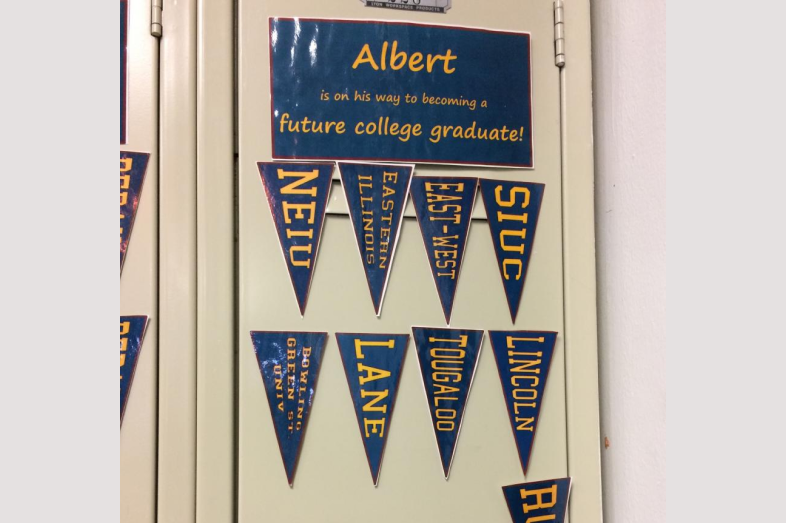

The Noble Network of Charter Schools is arguably Chicago’s most famous charter chain. Despite having schools only in one city and operating exclusively at the high school level, charter advocates now consider Noble to be in the same tier as KIPP and Achievement First — national brands in the no-excuses charter arena. (And this week, the Noble Network won the Broad Prize for the nation’s best Best Charter School.)
Mike Milkie, who founded Noble along with his wife Tonya in 1999, told reporters visiting as part of EWA’s National Seminar that the network had no plans to move outside of Chicago or to open middle or elementary schools. Instead, he said, they want to keep specializing in what they do best — opening and maintaining high-performing high schools that serve the unique needs of Chicago students.
A campus visit to Noble’s first location, Noble Street College Prep, highlighted many of the reasons why parents in Chicago are flocking to enroll their high school children.
The school produces impressive results: At Noble Street, students typically enter below grade level, but are accepted into four-year colleges at a higher rate than their similarly situated peers at other local high schools. And among recently graduated classes, 100 percent of students were accepted to college.
‘Behavior Improvement’ Class
However, a strict behavioral system accompanies the school’s academic success. Students can get detention for minor infractions, and accumulating 12 such punishments will result in either a four-week summer or 15-week after-school “behavior improvement” class. It’s an attitude reflected in every aspect of the school’s environment, from the squeaky clean facilities to the way the staff move purposefully through the hallways.
Student lockers lining the hallways are decorated with the names of all the colleges its seniors have been accepted into — with some lockers gleaming with more than seven or eight acceptances. Teachers can be seen moving quickly around their classrooms, checking work, quickly correcting behavior and prompting answers from students .
Visits from outsiders are so common that teachers often don’t notice a knock on the door. A student, specifically designated in each class, comes to the hallway to greet visitors. The student provides a summary of what the class is doing, and then invites guests into the room to roam as they please. They can lean over shoulders to look at student work, take pictures of classroom décor and leave whenever they want.
In the classroom, the teachers push students to be accountable for their own learning.
“I didn’t do the reading,” admitted a senior in a fast-paced English class. “I can’t answer that question.”
“Figure it out,” said the teacher, handing her a copy of the reading. “I’ll check in with you in a minute.” The teacher moved on immediately, pressing the class on a question about the author’s tone. Hands shot up all over the room.
Students at all Noble schools take two years of foreign language in their junior and senior years. There is only one option: Russian.
Milkie said that while Russian seems like an odd choice, it was made deliberately when he and his wife founded Noble Street. A majority of the students are native or at least proficient Spanish speakers. So, to reduce the logistics of having students studying at many different levels, everyone learns a completely new language. An added side benefit, he said, is the introduction to a culture the students are rarely familiar with.
The student who answered the door in one Russian language class, a junior with her Noble polo tucked neatly into her khakis, said the class is tough.
“I didn’t know any Russian before I took this class, but I feel like I can understand a lot now,” she said. She doesn’t know if she’ll take Russian in college (“Maybe Spanish would be better,” she said), but she’s having fun with it.
New Approach to Hiring
Behind the scenes, Noble has adopted a new approach to hiring staff. It is working with the Relay Graduate School of Education (an accredited master’s degree program created by the founders of KIPP, Achievement First and Uncommon Schools — three charter networks) to recruit Noble alumni to become teachers at their alma mater. Milkie said the program is “exciting” for the recruits, who will be certified to teach and have a master’s degree by the end of the program.
The Relay partnership is a two-year residency program, and allows first-year residents to pair with a current teacher and work in the classroom four days per week. They attend graduate-level classes each Friday and one Saturday per month. In their second year, residents make the jump to being full-time teachers at one of Noble’s schools. The network picks up all of the costs during the first year and $11,000 of the $17,500 tuition during the second.
This year, 12 former students are teaching in Noble schools and one alumna — Lamanda Silva of Noble’s Muchin College Prep — is serving as a principal. Milkie said having teachers who come from the same neighborhood and background offers students an example of what they can achieve.